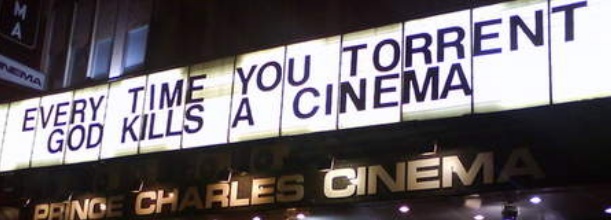Movie Pirates and Mouldy Popcorn

My favourite ‘don’t copy this film’ ad was from a few years ago, which pointed out that if you downloaded a film from the internet and watched it on your laptop, you’d have to put up with people walking in front of the lens every time they wanted to go to the loo. You can probably see where I’m going with this. Going to the cinema, I find, invariably involves having my view blocked by people getting up to go to the loo. It’s part of the fun of seeing a film in a huge room full of strangers eating snacks and slurping drinks: some of them dare to have bodily functions. It’s sort of annoying, but in a nice way. If you can’t handle other people, you might as well stay at home.

This same ad also bemoaned the less-than-perfect picture quality when downloading a film to your laptop. No crisp digital imagery and surround-sound for you, illegal file-sharer. You’ll get something crackly and flawed. But hang on a moment. Releasing films digitally has only become the norm over the last few years, and we now enjoy movies of a far greater quality than was ever possible ten, twenty or fifty years ago. But that doesn’t mean the films themselves are any better. iPods might have taken over from vinyl, but that doesn’t mean that music itself has improved.
That slightly stupid piracy ad has been re-invented many times. Who remembers the creepy fat guy with the branding iron? Or the endlessly parodied ‘You wouldn’t steal a MOVIE…’ one. Or ‘Knock-Off Nigel’? He wasn’t cool, but he also wasn’t paying £21 to sit on a pile of stale popcorn and queue for a blocked toilet when seeing Inception at Leicester Square. I have, and I sure as hell won’t be doing it again.
I work at a cinema, you see. A lovely one with comfy sofas, and prices significantly cheaper than aforementioned multiplexes elsewhere in zone 1. On Saturday nights we run a Retro season, screening films from yesteryear until about 2 in the morning. Last weekend it was Ghostbusters, and when everyone was snuggled up in their seats, our projectionist fired up the original 1984 35mm print we’d acquired, and we all revelled in the glorious authenticity of the thing. It was old, battered, and wonderful.

Bill Murray kept making loud crackling noises, and Sigourney Weaver decided to cut out the end of one scene altogether. That one where she opens the fridge. And although, sadly, the quality of the print deteriorated as the film went on, and we had to eventually abandon it for a digital copy, that transition in the projection box from flicking, winding reels to a humming computer felt like a great loss. It wasn’t quite so special any more.
Now, digital film releasing is a great invention. The copies have great sound and picture quality, can be reproduced and dispatched cheaply and easily, and can be operated at the touch of a button. But, this, sadly, has led to an inevitable decline in the use of trained projectionists: the wonderful people who sit in the box at the back of the theatre and cut together the 35mm prints in much the same way as has been done for over 100 years since that kind of film was invented. Look at this guy, for instance, he’s having a great time –

‘Thousands of people work in the UK film industry’, begins the latest anti-piracy ad. It asks you to think of them when you put their jobs at risk by downloading something illegally. But I’m thinking of the projectionists. Because if it’s cool to let them go, what, really, do we mean by ‘cinematic experience’? Is it basically just popcorn? Because I can make that at home, you know.
It’s a sad but inevitable fact of human progress that new technology eclipses old, but without a projectionist, the cinematic experience that those piracy ads stress the importance of becomes all the more uniform, and unimportant. Anyone could be pressing that button in the projection box. It most probably won’t be a projectionist: you can train anyone to press a button in a booth, so the box becomes as easy to work as a DVD player, and a cinema turns into a giant Sky Movies 1 with terrible hotdogs. And with 3D and HD just around the corner from becoming standard at homes across the country, how long can it really be before they offer a higher quality experience altogether than you’ll get at your local cinema?
The low-tech machinery of filmmaking and cinema has been disappearing for years in favour of new technology, and this risks damaging the real cinematic experience. To blame other new technology like the internet and digital cameras for its downfall seems false. Cinema is a business, or at least that’s what the ads are telling us, and the truth is that it’s the business of cinema that the ads seek to protect, not the authenticity of a great night out at the pictures.Today’s “authentic experience” – of a digital film running in a twelve-screen multiplex with sticky carpets – ain’t what it used to be. And piracy, let’s face it, didn’t get us there.







Recent Comments